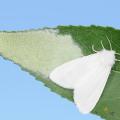Armored Scales
Scale insects are divided into two groups, armored scales and soft scales, and if you need to control a scale problem, it helps to know which type of scale you are trying to control. The most important distinction is that armored scales do not produce honeydew, while soft scales produce large amounts of honeydew. Armored scales also tend to be smaller than soft scales and have more generations per year. As the group names suggest, armored scales also have a harder, more scale-like covering than soft scales. Some of the most common species of armored scale include: tea scale, which is common on camellias and hollies; false oleander scale, which occurs more in the southern part of the state on leaves of magnolia and oleander; and euonymus scale, which is a serious pest of euonymus, especially evergreen species (E. japonicas and E. fortunei). Because they are mobile and do not have covers, newly hatched scales, known as crawlers, are relatively more susceptible to contact insecticides. Older life stages are best controlled with systemic insecticides, but some systemic insecticides work better than others against armored scales.
Control Armored Scale: When attempting to control heavy armored scale infestations it is usually best to use a combination of treatment methods. Begin by pruning plants to remove dead or dying branches or heavily infested limbs and to remove suckers and other excessive growth. Soil-applied systemic treatments of products that contain dinotefuran (Zylam and Safari) are especially useful against most armored scales. This treatment is slow-acting, but can provide long-term control. Rate depends on the size of the tree or shrub being treated; measure trees or shrubs and treat according to label directions. Sprays of contact insecticides, such as malathion or acephate (Bonide Systemic Insect Control), applied when crawlers are active, are also effective. Sprays of horticultural oil (such as Volck oil or Bonide All Seasons Horticultural & Dormant Spray Oil) are also especially useful against many armored scales, especially when applied a dormant sprays in late fall/early winter, or as delayed dormant sprays in early spring. Follow label directions carefully. In some cases, such as a planting of euonymus that suffers heavy, recurring infestations, replacing heavily infested plants with less scale-prone species may be the best long-term solution.
See Insect Pests of ornamental plants in the home landscape, pages 7-10 and pages 39-41 for more information on armored scale insects. See page 9 of this publication for information on how to determine when scale crawlers are active.
Publications
News
A grant from Coast Electric will allow for a renovation of the Mississippi State University Crosby Arboretum’s pollinator garden. Pat Drackett, director of the arboretum, said the pollinator garden was established in 2001 as the Explorers’ Garden. It is a 3,000-square-foot space with a variety of native and other plants that helps teach visitors how to create havens for pollinators.
The 2020 Fall Flower & Garden Fest will be a virtual, educational event this year.
A tent for camping in the woods can be a good thing, but a tent filled with caterpillars in a pecan tree can be bad news for homeowners.



